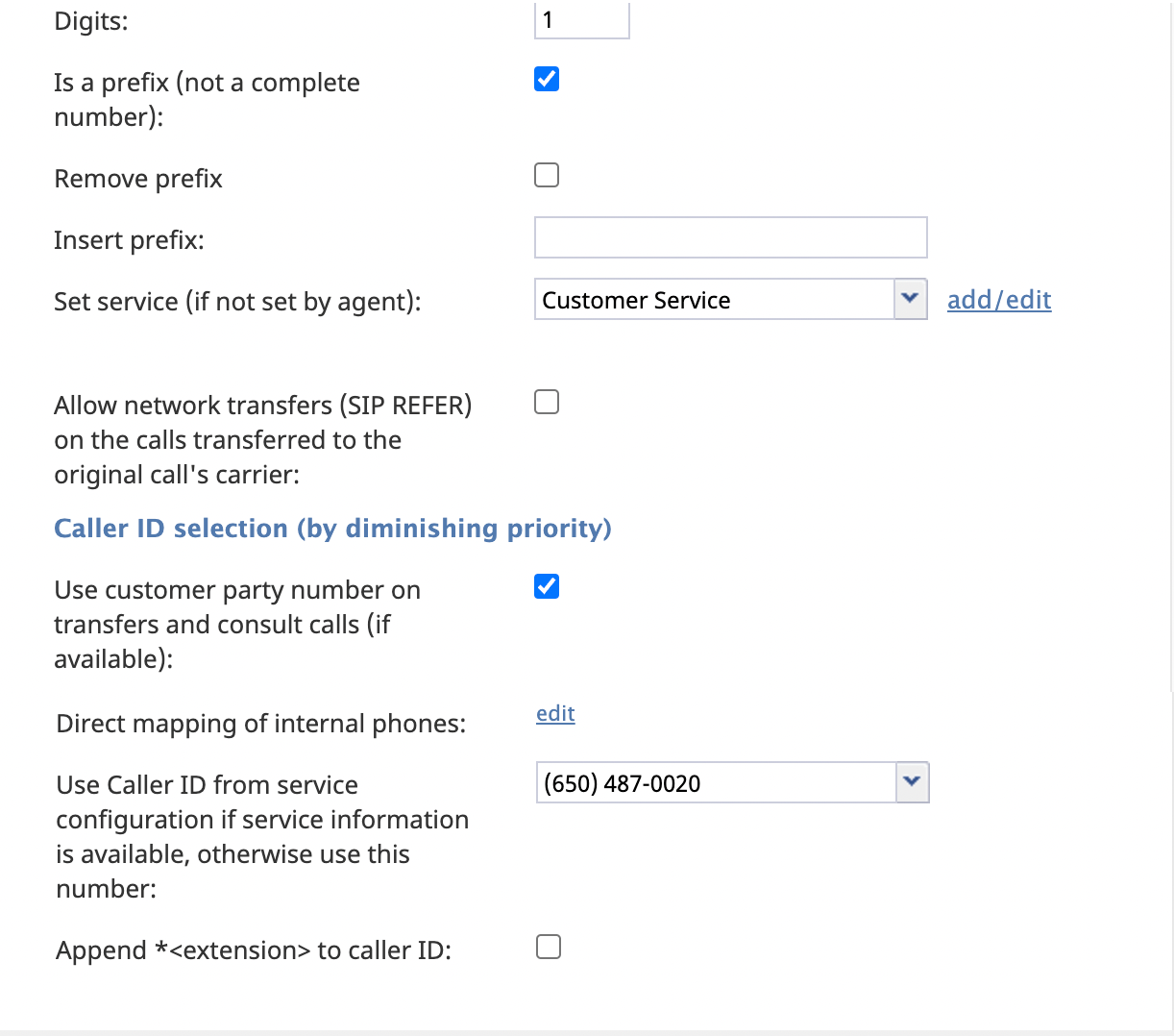Dial-out Entries
Dial-out entries define how outbound calls are made from the extensions of your contact center. The system recognizes a call as an outbound call by analyzing the first digit (or a set of digits) of the dialed number. Dial-out entries are also used to indicate services that will be associated with such outbound calls by default and to configure caller ID(s) for these calls.
Note the following:
- In order for the Use customer number on transfers and consult calls feature to work, the capability to transfer calls with the original calling party numbers must be enabled for your account. You can determine whether the capability is enabled for your account by looking for the Use customer number on transfers and consult calls checkbox (see below) on the Dial-out Entries screen properties pane. If you do not see it, contact your service provider for assistance.
- Before configuring your caller IDs, be sure to check all legal requirements and restrictions for what can be sent as a caller ID in the jurisdictions where you operate.
To configure a dial-out entry in the Contact Center Administrator application, navigate to Configuration > Directory > Dial-out Entries.
Dial-Out Entries
The Dial-out Entries screen properties are described as follows.
Digits
Digits are the numeric digits which, when dialed from an extension of your private telephone network, will indicate that an outbound call is requested. This set of digits can contain a leading plus (+) sign indicating international calling. This parameter is mandatory and must be unique within the contact center.
Is a prefix
Is a prefix indicates whether the above number is a prefix used only within your private telephone network, as opposed to being part of the PSTN number.
Remove prefix
Remove prefix indicates whether the digit(s) specified in parameter Digits shall be removed before transmitting the dialed number outside of your private telephone network.
Insert prefix
Insert prefix represents a set of digits (e.g., "011" for international calls) to be prepended to the number before transmitting the dialed number outside of your private telephone network. The digits can contain a leading plus (+) sign indicating international calling.
Set service
Set service is where you set the service associated with the specified Number. Association of outbound calls with services is optional and is useful when you want to be able to count separately calls made with respect to different services (e.g., for reporting and/or billing purposes).
Note that an outbound call can also be associated with a service via selection of the desired service directly from the Agent Desktop application. In case of a conflict, the service explicitly selected by the agent overrides the service defined by this setting. For more information, see section How to Make an Outbound Call of the Agent Guide.
Allow network transfers (SIP REFER) on the calls transferred to the original call's carrier
If this option is selected, then when a call comes in to your contact center and the agent wants to make a transfer, and if the SIP provider supports SIP REFER, and if the call is making it back through the same provider, then a SIP REFER message is sent to your provider and the call is directed by the provider to the destination.
Note that prior to Bright Pattern Contact Center version 5.5.5, this setting was known as Transfer trunk trombone calls using SIP REFER.
Use customer party number on transfers and consult calls
This option indicates whether a customer’s number of original service calls, if available, will be used as the Caller ID for associated outbound calls (i.e., external consultation calls, two-step and blind transfers, and calls forwarded to external destinations via scenarios) made via this dial-out entry. If this option is enabled, the Caller ID of the original call will be relayed regardless of whether such an original call is inbound, regular outbound, or a campaign call.
Note: This option must be explicitly enabled by your service provider before it can be used in your contact center. If this option is not enabled by the service provider, the Caller ID will be set according to one of the following methods.
Direct mapping of internal phones
Direct mapping of internal phones allows you to select the extensions for which their personal caller IDs will be displayed when making outbound calls via this dial-out entry. Usually these are the DID extensions with direct external access numbers assigned to them. To select such extensions, click edit.
This option will be disregarded for the cases where the above setting applies.
Use Caller ID from service configuration if service information is available, otherwise use this number
This option specifies the number that will be displayed to called parties when they receive a call made through this dial-out entry, unless a service was selected manually for this call (see description of property Set service above).
If a service was selected manually for an outbound call, one of the numbers specified as a caller ID for the selected service will be displayed. For more information, see section Services and Campaigns - Numbers Tab.
This option will be disregarded for the cases where either of the above two settings applies.
Append *<extension> to caller ID
This setting allows you to append the user's extension to the access number selected in this dial-out entry as the calling party number. This setting will append the extension as well as the * symbol, which will be placed between the number and the extension. Note that this setting is relevant for tenant PBX trunks that connect to cloud PBX systems.

